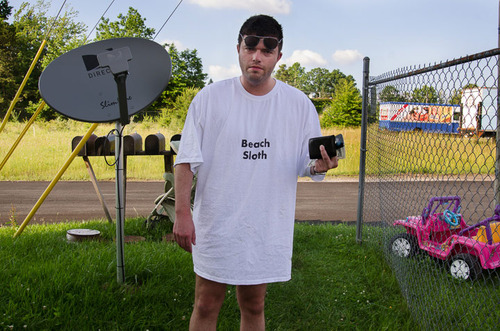
Photograph of Scott McClanahan by Stacy Kranitz
Scott McClanahan in Conversation with Stacy Kranitz
I was introduced to photographer Stacy Kranitz’s work through Scott McClanahan, author of Crapalachia and Hill William. Krantiz’s images are visceral and haunting, but never betray her subjects. It seemed to me that she took the same care and tenderness in photographing the people of Appalachia as Scott did in his writing of them. I felt a sense of protection over Appalachia coming through in both of their work and thought it would be interesting to pair them to discuss exoticizing poverty, insider vs. outsider artists, and problematic representations of culture.
—Karolina Waclawiak
I. PORK
SCOTT MCLANAHAN: I don’t think you answered why you like to take pictures of guys without their shirts on.
STACY KRANITZ: That is easy to answer. When I first started traveling, I learned that being a woman traveling alone actually made you a real target. I was sexualized and it was very aggressive. So I thought a nice way to react to that was to sexualize young boys. So that is what that started as. But it is really easy for me to fall in love, and I have a type, and that type has their shirt off all day.
SM: [Looking over the notes of topics] I really like your topics. “Mountaintop Removal.”
SK: Well I really wanted to say the rape of Appalachia a lot in this interview and I thought, mountaintop removal is the physical manifestation of the rape of Appalachia. I was just looking for different ways that I could get that phrase in.
Okay, so we are just going to see if we agree on what we are talking about. Is that ok?
SM: Yeah, sure.
SK: Do we agree that Appalachia is a place where there is an extensive history of exploitation?
SM: Yeah but I think that’s true about anywhere. Like even LA or the surrounding areas of LA. All those poor little towns around there that dry up because LA is stealing their water.
SK: Well, do you agree that when academics and non-profit organizations talk about Appalachia that they say that there is exploitation?
SM: Well of course, it’s a way to make money. They all have the same spiel. It’s almost like they went to the same schools together and learned the same sort of language.
SK: Like Zombies.
SM: Like Zombies, exactly.
SK: But would you agree with this, that Appalachia is a place that’s been forced into a position of representing poverty in America?
SM: Oh of course, yeah. I think that’s true. And I think...
You have reached your article limit
Sign up for a digital subscription and continue reading all new issues, plus our entire archives, for just $1.50/month.
Already a subscriber? Sign in




